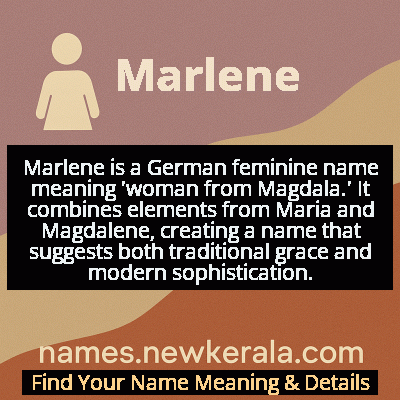Marlene Name Meaning & Details
Origin, Popularity, Numerology Analysis & Name Meaning of Marlene
Discover the origin, meaning, and cultural significance of the name MARLENE. Delve into its historical roots and explore the lasting impact it has had on communities and traditions.
Name
Marlene
Gender
Female
Origin
German
Lucky Number
5
Meaning of the Name - Marlene
Marlene is a German feminine name meaning 'woman from Magdala.' It combines elements from Maria and Magdalene, creating a name that suggests both traditional grace and modern sophistication.
Marlene - Complete Numerology Analysis
Your Numerology Number
Based on Pythagorean Numerology System
Ruling Planet
Mercury
Positive Nature
Adventurous, dynamic, curious, and social.
Negative Traits
Restless, impatient, inconsistent, prone to indulgence.
Lucky Colours
Green, white.
Lucky Days
Wednesday.
Lucky Stones
Emerald.
Harmony Numbers
1, 3, 9.
Best Suited Professions
Sales, marketing, travel, entertainment.
What People Like About You
Versatility, charisma, adventurous spirit.
Famous People Named Marlene
Marlene Dietrich
Actress and Singer
Iconic German-American actress known for 'The Blue Angel' and her opposition to Nazi Germany
Marlene Dumas
Visual Artist
Influential South African painter known for her expressive portrait works
Marlene Hagge
Professional Golfer
LPGA co-founder and World Golf Hall of Fame inductee with 26 tour victories
Marlene Favela
Actress and Model
Mexican telenovela star known for roles in 'La Madrastra' and 'Alma de Hierro'
Name Variations & International Equivalents
Click on blue names to explore their detailed meanings. Gray names with will be available soon.
Cultural & Historical Significance
The name's cultural significance extends beyond Germany, particularly in Hollywood's Golden Age where it came to represent European sophistication and artistic integrity. In Latin American countries, Marlene gained popularity through telenovela actresses, adapting the name to local cultural contexts while preserving its elegant connotations. The name continues to carry associations with creative excellence and personal strength, making it a popular choice for parents seeking a name with both historical depth and contemporary relevance. Its enduring appeal across generations demonstrates how a name can evolve while maintaining its core cultural identity.
Extended Personality Analysis
Women named Marlene are often perceived as sophisticated, independent, and artistically inclined individuals with a strong sense of self. They typically exhibit a blend of traditional elegance and modern assertiveness, carrying themselves with a quiet confidence that commands respect. Marlenes are frequently described as creative problem-solvers who approach challenges with both practicality and imagination. Their personality often combines emotional depth with intellectual curiosity, making them engaging conversationalists and loyal friends.
Many Marlenes display a natural charisma that draws people to them, yet they value their privacy and maintain clear personal boundaries. This balance of warmth and reserve contributes to their reputation as trustworthy, discerning individuals who form deep, meaningful relationships. They tend to be perceptive judges of character and often serve as confidantes to those close to them. While they can be reserved in large groups, in intimate settings they reveal a witty, insightful nature with a keen appreciation for beauty in all its forms—whether in art, nature, or human relationships. Their strength often manifests as quiet resilience rather than overt dominance, making them effective leaders who inspire through example rather than command.
Modern Usage & Popularity
Marlene maintains steady but moderate popularity in German-speaking countries and has experienced periodic revivals in English-speaking nations. In the United States, it peaked in the 1930s-1940s following Marlene Dietrich's rise to fame and has since settled into occasional usage, often chosen by parents seeking a classic yet distinctive name with European flair. The name enjoys stronger continuous usage in Germany, Austria, and Switzerland, where it's considered both traditional and stylish. Recent years have seen increased interest in vintage names, leading to a slight uptick in Marlene's popularity among parents drawn to its sophisticated sound and cultural heritage. It remains particularly popular in artistic and academic circles where its association with creative excellence resonates.
Symbolic & Spiritual Meanings
Symbolically, Marlene represents the fusion of traditional femininity with modern independence, embodying the tension and harmony between these dual aspects. The name carries connotations of artistic expression, personal integrity, and cosmopolitan sophistication. Its connection to Mary Magdalene adds layers of spiritual symbolism—representing redemption, devotion, and the transformative power of faith. The 'mar' element evokes the sea, suggesting depth, mystery, and emotional fluidity, while the 'lene' component implies softness and grace. Together, these elements create a symbolic profile of a person who navigates life's complexities with both strength and sensitivity. The name also symbolizes cultural bridge-building, reflecting its journey from German origins to international recognition.

